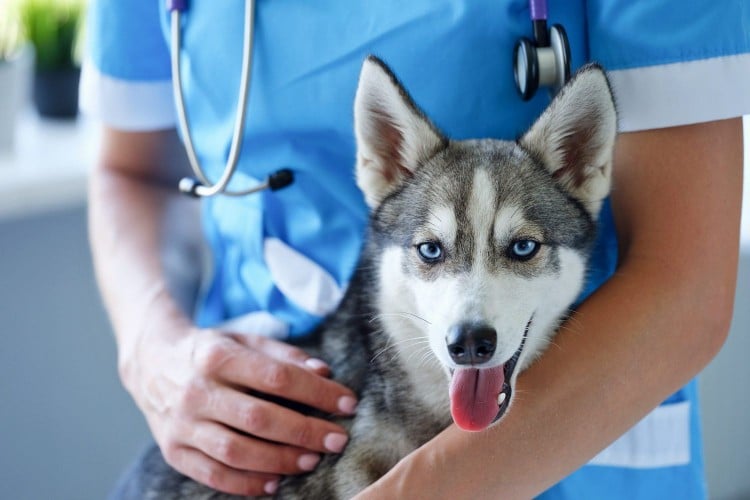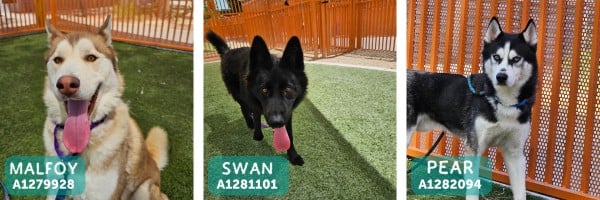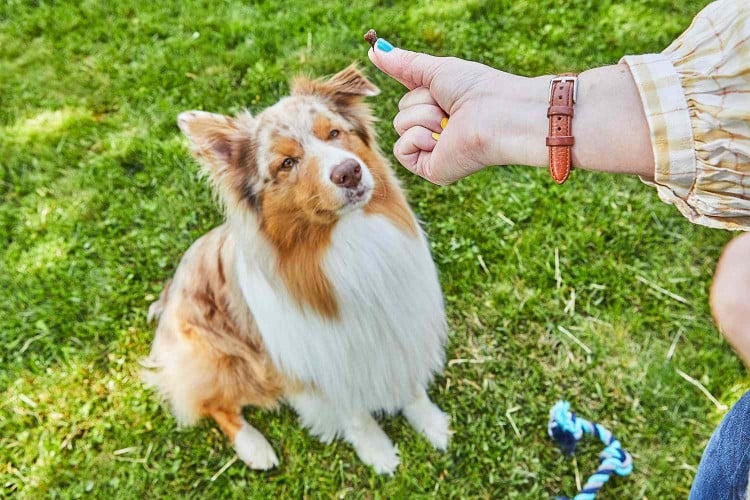Is Your Dog Wheezing? Here's What Might Be Causing It and When To Call a Veterinarian

A dog wheezing makes a distinctive, worrisome sound, but the cause behind your pup's discomfort might be hard for you to pin down. That's why you should contact your veterinarian—quickly.
Several health problems—including heart and respiratory disease—can cause breathing issues like wheezing, so you'll need your vet to determine whether your dog is in serious condition, says Lori Bierbrier, DVM and senior medical director for ASPCA Community Medicine.
Here's more information on what causes a dog to wheeze and what you can do to make your pup feel better.
As Seresto Flea Collars Come Under More Scrutiny, Here's What Dog Owners Should Consider
Why Is My Dog Wheezing?
Several factors can leave you with a wheezing dog, from an obstructed airway to heart disease to, unsurprisingly, kennel cough.
Asthma
Bierbrier says asthma in dogs isn't particularly common, though some dogs suffer from it as the result of an allergic reaction. Asthma can also cause persistent coughing, rapid breathing, a blue(ish) tongue color, and decreased energy, she says.
Heart Disease
Wheezing isn't just a warning sign for the lungs; it can also be a sign that your dog could have heart disease, Bierbrier says. Unfortunately, heart disease largely goes unnoticed until your dog starts showing signs of heart failure, including respiratory problems like wheezing and coughing, weight loss, weakness, and collapsing or fainting.
Collapsed Trachea
While this sounds serious (and in many cases it is), dogs with collapsed tracheas can often live full lives in spite of their altered windpipe thanks to medication and surgery. Along with coughing that sounds like a honking goose, wheezing is another sign your dog could have a collapsed trachea.
Kennel Cough
Kennel cough is the overarching name for several respiratory illnesses that causes dogs to, well, cough. It can also cause them to wheeze. It's spread from dog to dog at places like pet boarding facilities, dog parks, or daycare. But there is a vaccine, called the bordetella vaccine, that can help protect your pup.
Choking
A choking dog can make a variety of noises—including wheezing—when they have something caught in their throat. Thankfully, choking is pretty rare for dogs, but we know what to do if it happens to your dog. (Just maybe take it easy with the rawhide and bully stick treats.)
What Does a Wheezing Dog Sound Like?
It might not be what you're expecting. According to Emergency Vets USA, your dog's wheezing will sound like a "whistle or rattle," similar to a flute quietly playing.
So it's different from your dog coughing, sneezing, or reverse sneezing. Of course, if your dog is making any kind of unfamiliar sound, it's best to consult your veterinarian.
What to Do When Your Dog Starts Wheezing
At the very least call your veterinarian, but it's probably a better idea to head to their office right away. Your dog needs to be seen by a vet as soon as possible because the wheezing could indicate a life-threatening problem, Bierbrier says.
You need an accurate diagnosis, which will likely include a full physical exam as well as an X-ray of your dog's chest. Then your veterinarian can prescribe the necessary treatment or medication to make your pup more comfortable.
If your veterinarian isn't open, find your local emergency veterinarian. If it's later in the evening or very early in the morning, that's going to be one of the only places where you can get the care your dog needs.
9 Signs That You Need to Get Your Pet To the Emergency Room
The possibility of emergency care might be a good reason to invest in pet insurance, which can help cover those immediate costs. You should consider insurance if your dog belongs to a brachycephalic breed. Those dogs, with flat faces and short snouts, are prone to more breathing issues in general, Bierbrier says.
Preventative Home Remedies for Dog Wheezing
To be clear, these methods can help prevent wheezing from asthma or allergies. They are not—not—medical remedies that will stop your dog's wheezing. You'll need to go to the veterinarian for that.
To reduce the likelihood of your dog wheezing because of an allergic reaction, Bierbrier recommends:
- Regular vacuuming
- Cleaning pet beds
- Installing an air purifier
- Not smoking in the house
- Lessening the use of air fresheners, perfumes, and other fragrances








